Miffy x Ghostly clothing collaboration! Weird Egyptian art at Valley of Kings tombs, Queen Hatshepsut, Luxor temple.

Goths adore ghosts… and Miffy the cute bunny… so why not bring the two together?
The twain have in fact now met: Miffy has a spook-tacular fashion collaboration with Ghostly!
Let’s start this story with the new Miffy new clothing line. Then, we’ll continue my Egypt Travel Talk adventures by descending into the tombs of pharoahs, and traversing the temples of queens.

Who’s that haunting my t-shirt? As you know, I adore Miffy the cute bunny character from the Netherlands. She teamed up with Ghostly International, an indie music, art, and street fashion company, for a clothing collab. (Above is the print on the back of my shirt.)

The merging of Miffy x Ghostly is perfection. Both have cute mascots outlined in black and white, and take a playful, minimal approach to their designs.

Ghostly’s sceptre logo floats over the center of the top. Can you spot Miffy peeking out from behind the yellow square? (This is a size S unisex shirt, which I hemmed for a cropped look.)

The Miffy / Ghostly limited edition collection includes four t-shirts, a hoodie, and a tote bag — I want it all! Everything is printed in the USA, and features original bunny illustrations by Dick Bruna, with a fun Ghostly spin.
Everything’s available on the Ghostly International website; go swoop these up before they’re gone.
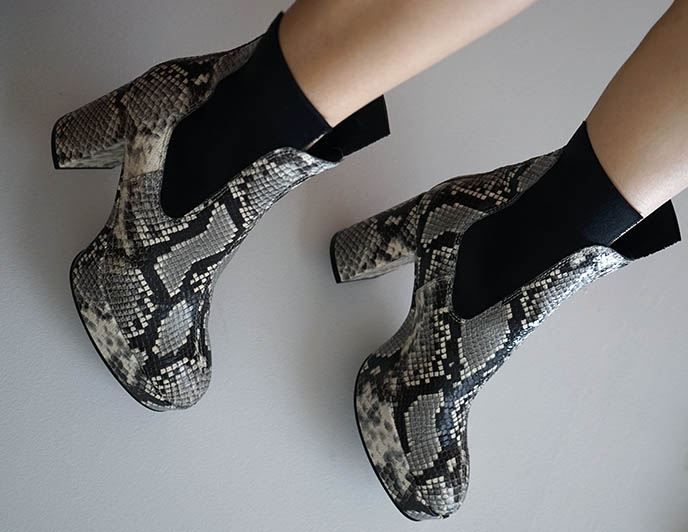
I also wanted to share my early birthday gift to myself… I nabbed these Acne Studios platform python boots! The monochrome snakeskin is easy to match with outfits, and the Chelsea-style ankle booties are easy to slip on and walk in.
These Acne leather platform boots are currently 60% off here, in case you wanted to get a pair and match me… it’s a crazy good deal.
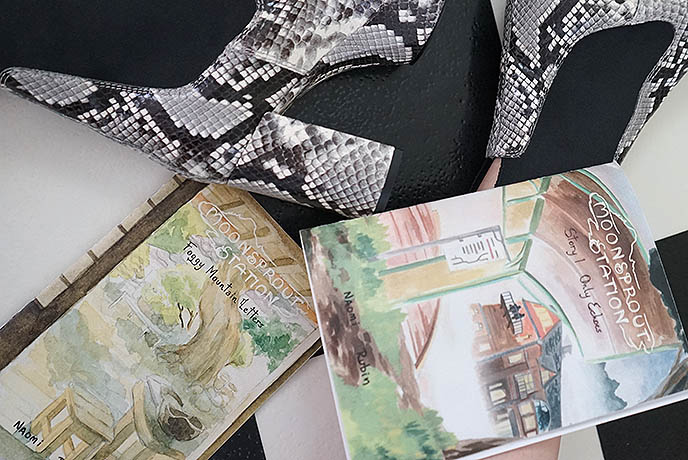
I was also tickled pink to receive a copy of Moonsprout Station — it’s a comic by Naomi Rubin (my First Mate who works with me on our crazy TV productions around the world). She created this hopeful fantasy comic about queer identities and relationships, which takes place in a sweeping, mysterious natural setting.
In her words: “Moonsprout Island is a diverse place where queer characters “just are” and their identity isn’t questioned or stigmatized. I talk about issues and questions that are important to me without harmful fantasy tropes.”
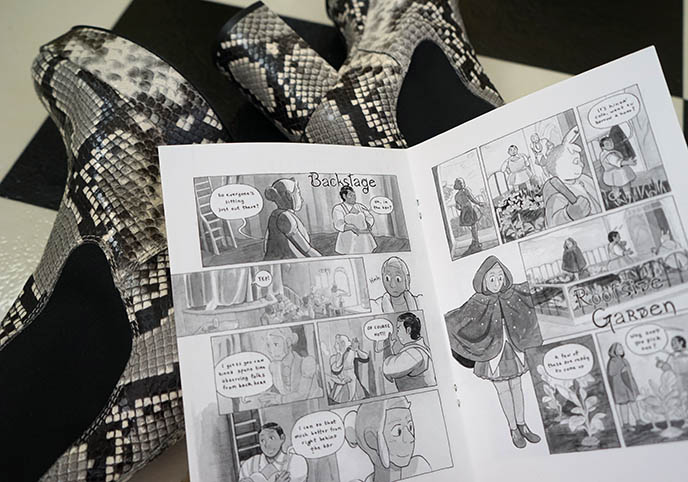
Naomi has made Moonsprout Station free for anyone to read online here, “because I want hopeful, comforting queer narratives to be available to anyone.” You can also read the full pages on Webtoon and Tapas.
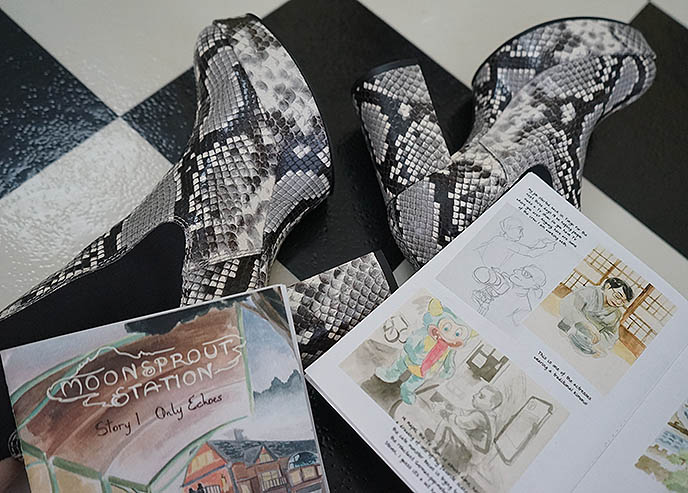
She has also published Foggy Mountain Letters, a chronicle of our recent adventures in Asia, as well as shooting with German TV in Tokyo. Above, you might recognize the crazy monster character we featured on the show!
“In the Summer of 2018, I went to Japan for a job with my swashbuckling captain La Carmina, and afterwards we got to travel for a bit around Japan and Thailand. I got to do lots of drawings on the trip but didn’t know how to put them in my comic – so I started mailing letters and drawings about our travels to my own fantasy characters. It got kind of out of hand, and now it can be in your hands!”
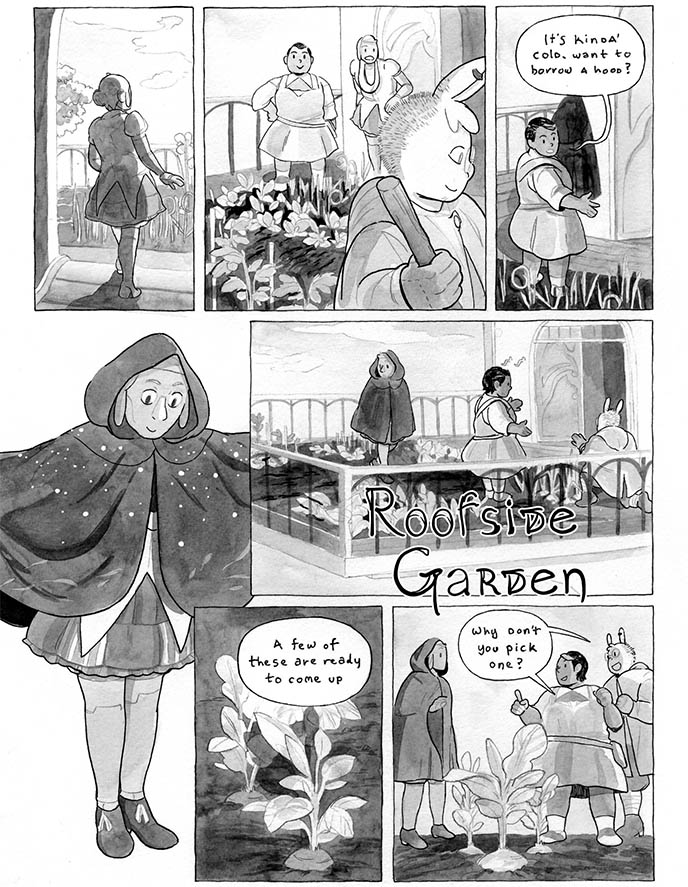
I hope you’ll consider supporting Naomi’s art and mission — these comics are a joy to read, and let you peek into our alt universe! The print books also include bonus stories and extras that you can’t see online.
You can get a copy Moonsprout Station here, and Foggy Mountain Letters here. Great news, La Carmina readers have a special promo code / voucher: 2 dollars off each, with the coupon code “basilmrao”!
You can also support Naomi Rubin via her Patreon, a “members-only sketch blog and tool shop, where I post sketches, artwork, and drawing resources that I don’t post anywhere else.”
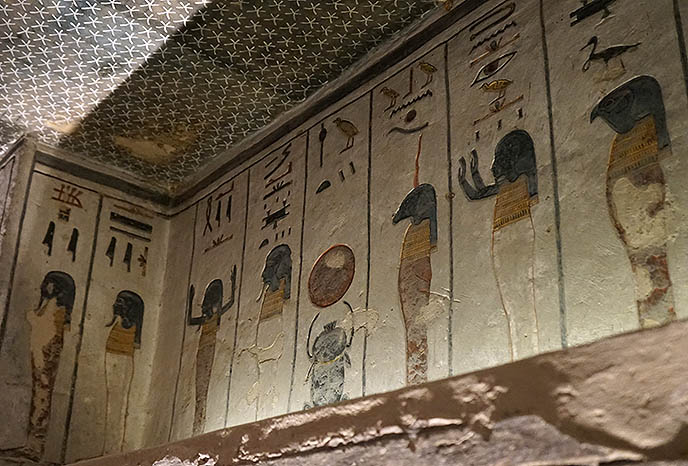
Now, let’s hang out with the ghosts of ancient Egyptian pharoahs! While in Egypt with with Travel Talk Tours, I got to see one of the country’s most impressive archaeological sites: the Valley of the Kings.
If you are especially intrigued by strange Egyptian rituals and tomb art, then this burial ground cannot be missed.

The Valley of the Kings is located just outside Luxor (the ancient settlement once called Thebes). The Egyptians may have chosen this as a royal burial site because of the pyramid-like peak (on the left) in the Theban Hills.
To this date, archaeologists have excavated 63 tombs here — and many more mysteries lie beneath the sandstone. Every year, they discover new treasures, which lead to more questions than answers.
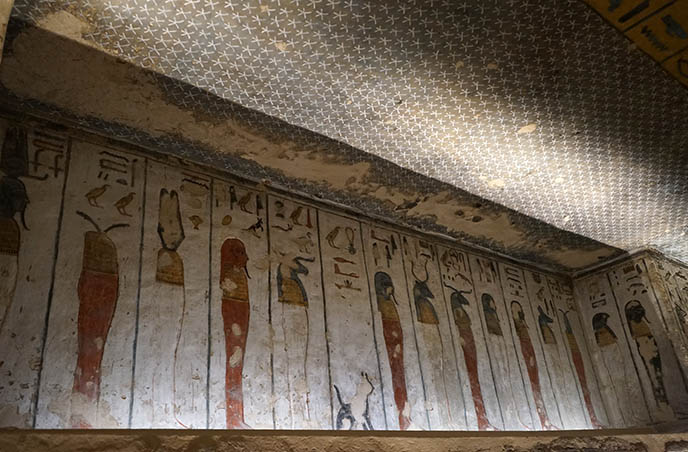
The Valley contains the tombs of some of Egypt’s most famous pharoahs (Seti I, Ramses II, King Tutankhamun) as well as their wives, children, and some nobles.
Notice the cat in the middle of these god-figures… kitties were considered sacred and treated like divinities back then.
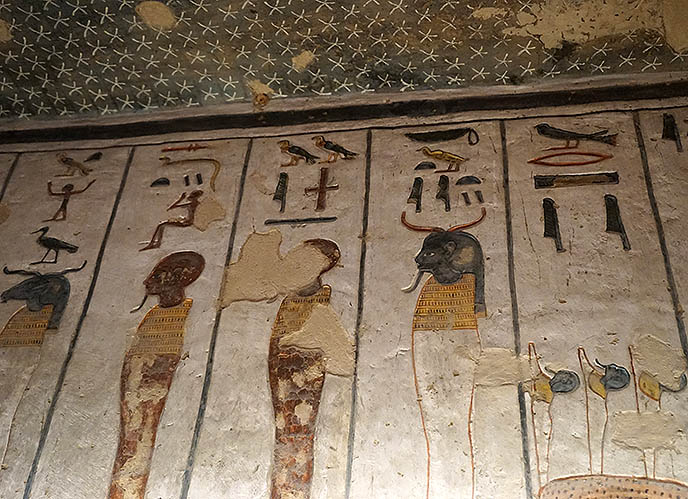
The art that covers the burial chambers is wild, especially considering that they date back thousands of years (16th to 11th centuries BCE).
Yukiro and I were captivated by the stars that covered the ceilings, as well as the devilish horned gods and Sphinxes.
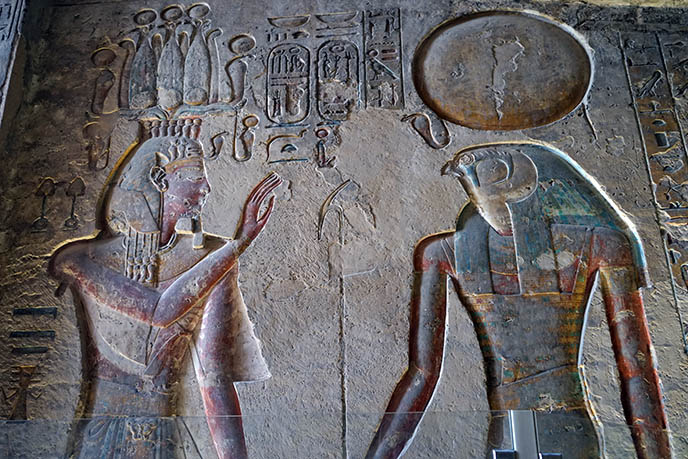
Since these royal graves were so well-preserved under the mountain, you can still see the original pigment of the bas-reliefs. Most people think of Egyptian wall carvings as colorless, but in fact, they were painted in brilliant shades.
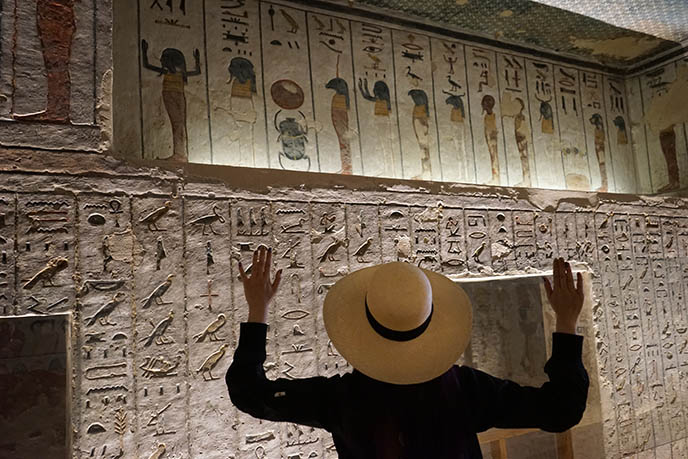
No wonder the ancient Egyptians are associated with death, aliens, and the occult… just look at these bizarre paintings. Who (or what) are they hailing?
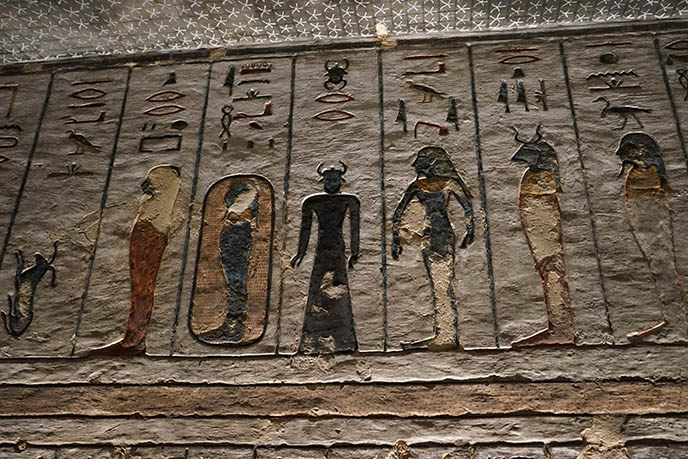
I focused on snapping photos of the weirdest, creepiest artistic elements for you. The scarab-head god, Khepri, is quite the spooky sight… The ancient Egyptians had quite the imaginative pantheon of animal-headed gods!
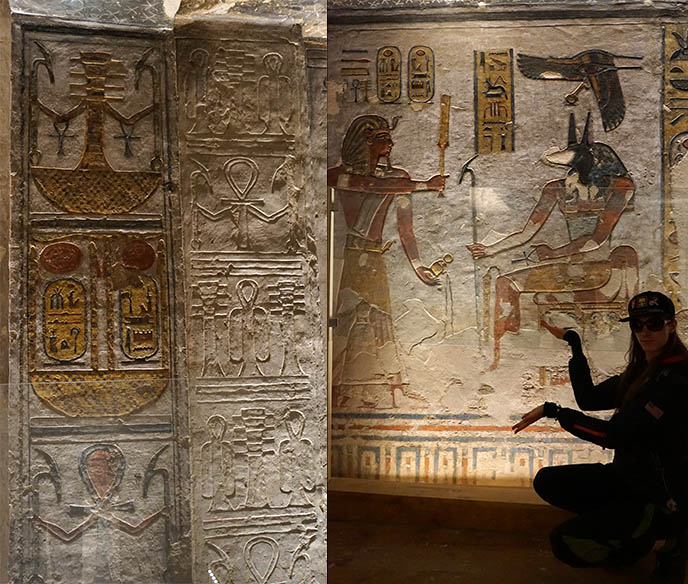
One of the many benefits of Travel Talk Tours was the ease of visiting sights like Valley of the Kings. Our group arrived here by bus, and our guide got our tickets so we didn’t have to wait in line.
The general ticket lets you visit three tombs (different ones are open to the public at different times; usually you can choose from around 10). If you want to take photos inside, you also have to purchase a photography pass.

King Tut’s burial site (KV62) also requires a separate ticket. While most of the royal chambers had been looted over time, the famed tomb of Tutankhamun was discovered nearly intact in 1922 by Howard Carter. You can still see his mummified body inside, but not the famous blue and gold death mask and treasures (those are in various museums worldwide).
Unfortunately, due to a mix-up, we didn’t receive a ticket and weren’t able to enter… looks like the “curse of the pharaohs” lives on…

Nevertheless, we got to wander through three other Valley of the Kings tombs, which were covered in mysterious spiritual renderings. The three-headed snake with legs and ankhs drew our attention.

Aren’t the rich colors outstanding (and surprising?) Most of the Valley of the Kings tombs were desecrated ages ago, and the treasures have gone missing. However, the decorated corridors remain in remarkable condition.
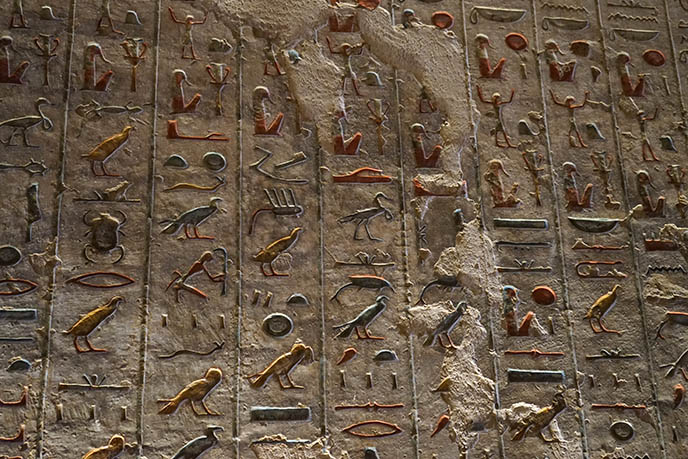
In their heyday, these hieroglyphics were likely rainbow colored! The ancient Egyptian writing system was remarkably advanced.

Most of the tomb artwork shows the dead’s journey through the night, and into the afterlife. The pharoah had to travel safely through the underworld by boat.

Then, the king would have his heart weighed against a feather. If the scale found his soul to be lighter, Osiris would receive him into eternal life.

The ankh, which symbolizes life, is favorite of Egyptians — as well as vampire and Goths. These ankhs are so powerful that they have arms!

Egyptian symbolism tends to appeals to Goths, as there are many occult leanings, and deadly or horned creatures.
Case in point: coiled cobras and Anubis, the jackal god of death and embalming.

What’s the deal with these headless creatures? And how odd are their poses…
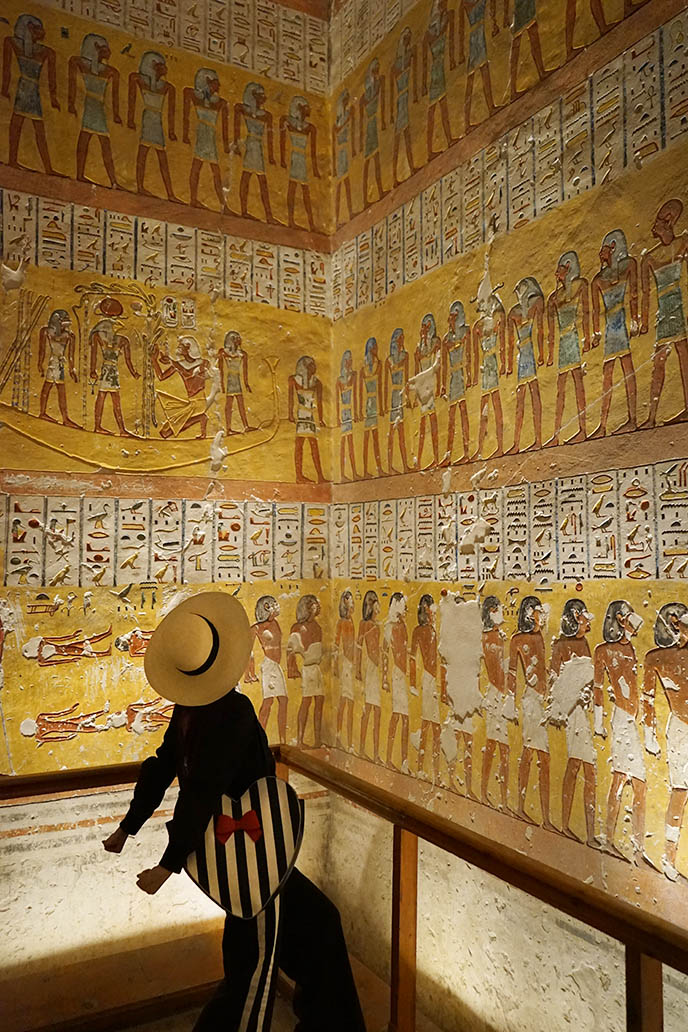
I tried out this new “walk like an Egyptian” posture.
I wore a hat from Tenth Street Hats, wide legged pants by Charli Cohen, and a heart Hope bag by Lola Ramona.

Ready for the Satanic connection?
The depiction of Baphomet is based on the Egyptian ram god pictured above. He was known as Banebdjed, and had a cult of worship at Mendes; in Upper Egypt, his name was Khnum.
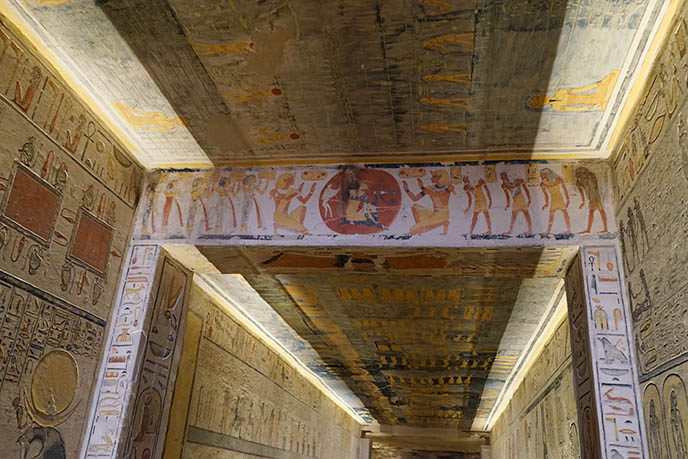
This devilish ram-headed god is found on the walls of many chambers and corridors.

At other Egyptian temples, the depictions of figures is relatively “standard.” However, in the Valley of the Kings, things get literally topsy-turvy.
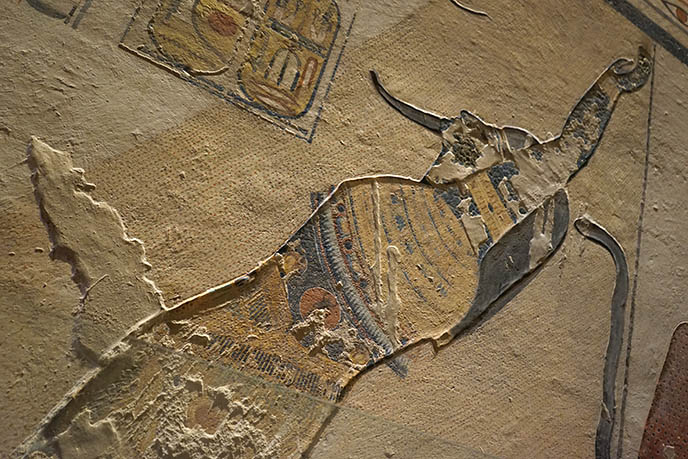
Plus, there are racy elements. I think you can guess what got scratched out…
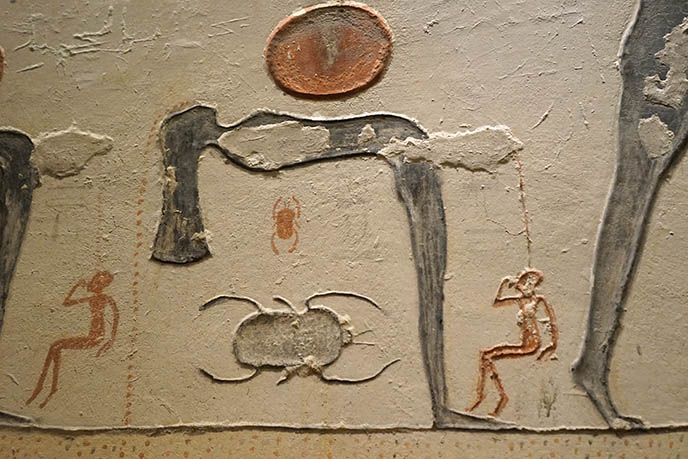
Well that’s an… interesting way to take a shower. (I’m guessing you will only find photos of Egyptian oddities like these on this blog!)

Here’s Thoth as a baboon, hailing Anubis (watcher of the dead) and the horned one.

The Valley of the Kings let us get a deep look into the esoteric beliefs and rituals of the ancient Egyptians. To this day, we don’t understand all the mysteries in these tombs.
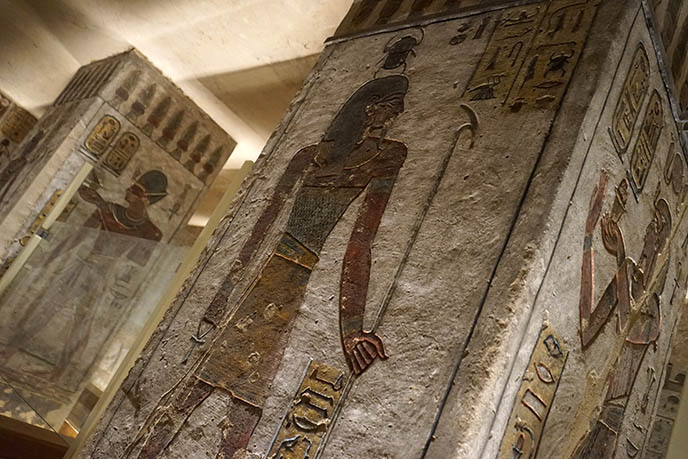
Watch out, there’s a scarab dancing on your head! Despite his eerie look, the black beetle god Khepri represented the rising sun and creation of life.

Gotta read em all… Most hieroglyphs were phonetic, meaning that a picture-symbol corresponded to a particular sound.
(Yukiro illustrates this with his Pokemon cap — R for Team Rocket!)

Most of the tombs burrowed deep into the mountain, with the tunnel ending in a shrine to the dead. This one held a giant stone sarcophagus decorated with jackals.
I’m sure you can see why we were captivated by the Valley of the Kings. I’m still wrapping my brain around the wonderful weirdness we encountered.
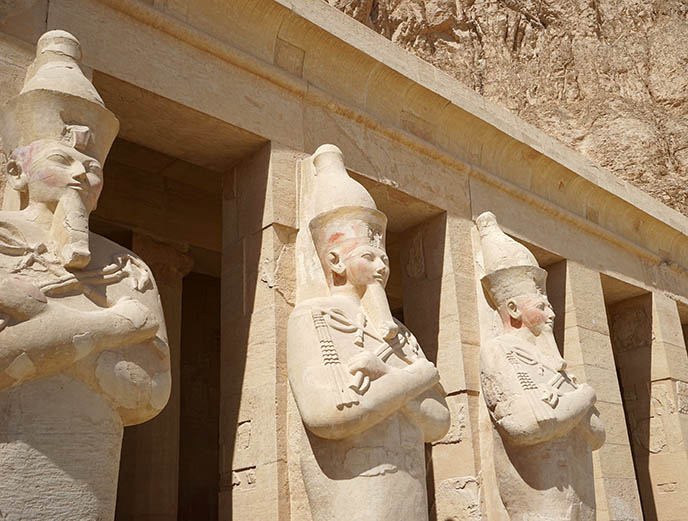
On the same day, Travel Talk Tours took us to see Queen Hatshepsut’s mortuary temple, which is also in Luxor.
The powerful Egyptian queen ruled from 1507–1458 BCE. While she technically joint-ruled with her young son Thutmose III, you can say she was the one who wore the beard and held the whip!

The Mortuary Temple of Hatshepsut featured a chapel dedicated to Anubis, jackal-headed god of mummification.
I was glad to have my Tenth Street Hats sunhat to shield me from the sun. My pants are Charli Cohen, and this heart and bow purse is Lola Ramona.

The Egyptians were so progressive that Hatshepsut was the third woman to become a pharoah and rule the country. However, she stands out because she was the first to have full power.
Her temple also breaks ground by showing the divine birth of a female ruler through art.

The funerary temple includes this wall, showing an offering to Horus. Note the stars on the ceiling once again; the ancient Egyptians had a keen interest in astronomy.
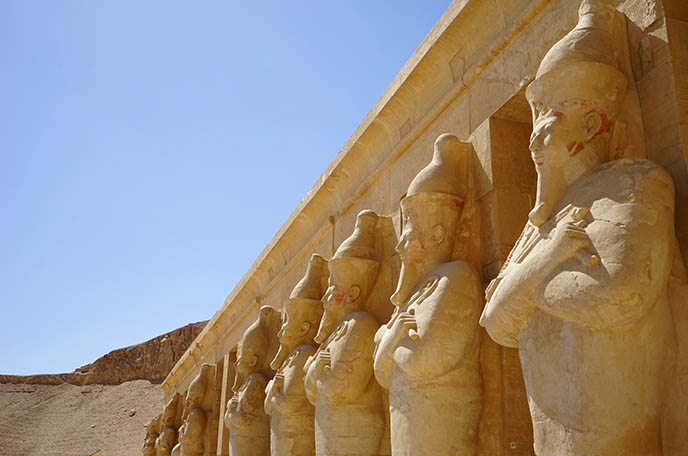
Walk up the stairs, and you’ll be greeted by a row of bearded ladies. The pillars show Queen Hatshepsut as Osiris, god of the afterlife and the underworld.

Hatshepsut is depicted with all the symbols of a powerful pharoah. She wears a false beard, and the “bowling pin” double crown that signifies her power over all of Egypt.
The queen also holds a crook and flail, which were derived from farming tools and show her rule over the people. (They also look quite a lot like dominatrix equipment!)

We’ll end with a final temple: Luxor after dark. I recommend visiting Luxor Temple at night, as the temperatures are cooler and the statues are illuminated in a haunting way.
This temple was an important religious site, and conveyed the power of Egypt’s pharoah (it was likely the coronation site as well). Imagine how an ancient civilian would feel, standing in front of the colossal pylon entrance, obelisk, and king statues.

Even in this modern age, you can’t help but feel floored by the gigantic seated statues of Ramses II. He wears a royal nemes headdress topped by the double crown, and has a uraeus (rearing cobra) at his forehead.

Luxor Temple was constructed by a succession of pharoahs around 1400-1200 BCE, including Amenhotep III, Tutankhamun, and Rameses II.

Cower past the giant seated statues, and you’ll reach the court of Ramesses II. The pharoah is shown at different ages, and stands stiffly next to the columns.
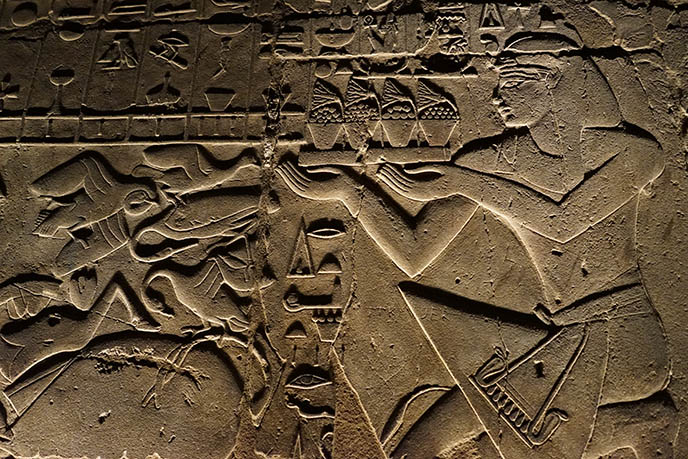
As you wander through Luxor temple, be on the lookout for fine carvings. Love the elegant rendering of these flying birds.
Our tour guide also pointed out cartouches, or ovals encircling hieroglyphs that spelled out a royal name.

Ramses II truly knew the power of scale, in the temples that he built and number of children that he fathered. (Remember our visit to Abu Simbel, which was dedicated to him as well.)

Our guide pointed out this statue of King Tut and his wife Ankhsenamunat, who was also his half-sister. Tutankhamun, son of Akhenaten, became king at age 9 and died at age 19. They had two daughters together that were stillborn with defects (likely from inbreeding).
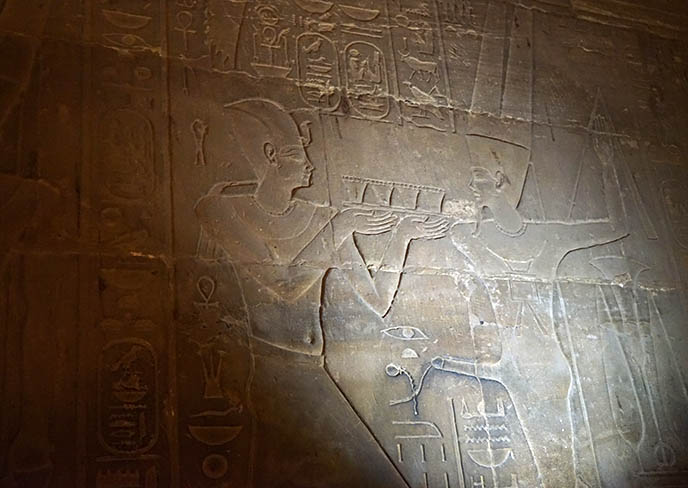
Luxor Temple is enormous, so we were glad that our Travel Talks guide showed us the major attractions, before giving us time to roam freely.
He pointed out this 4000 year old bas-relief of the god Min. Did the Egyptians somehow know about the shape of a sperm, thousands of years before microscopes were invented? (Cue the alien conspiracists…)

Later on, Alexander the Great conquered Egypt. He added a granite shrine to Luxor Temple, presenting his rule as legitimate.

What do you think ankhs taste like… birdseed? (This cross-like symbol gives the soul the breath of life, to bring them to the afterlife.)

With stiff shoulders like this, Ramses II looks like he could use a massage.

I hope you’re digging our tales of Egypt with Travel Talk Tours. Their 18-30 something group tours are led by a local, and are a fab way to see the most impressive ruins in the country.
Alas, I only have one post left from this trip, but it’s a good one… Cairo’s Egyptian Museum awaits.
View this post on Instagram
PS: I was honored to be interviewed by Travindy about sustainable travel! I shared my thoughts on showcasing offbeat sites, issues with over-tourism, and how technology can help combat these problems.
PPS: a clip of my new Acne snake-skin leather ankle boots in motion. They’re crafted in Italy, and have a chunky platform sole / heel for an edgy look.
You can find these Acne platform boots here for 60% off, along with other major reductions on designer fashion right now. Happy shopping!
SHARE & COMMENT

 LA CARMINA
LA CARMINA







1 Comment
Love your style! <3